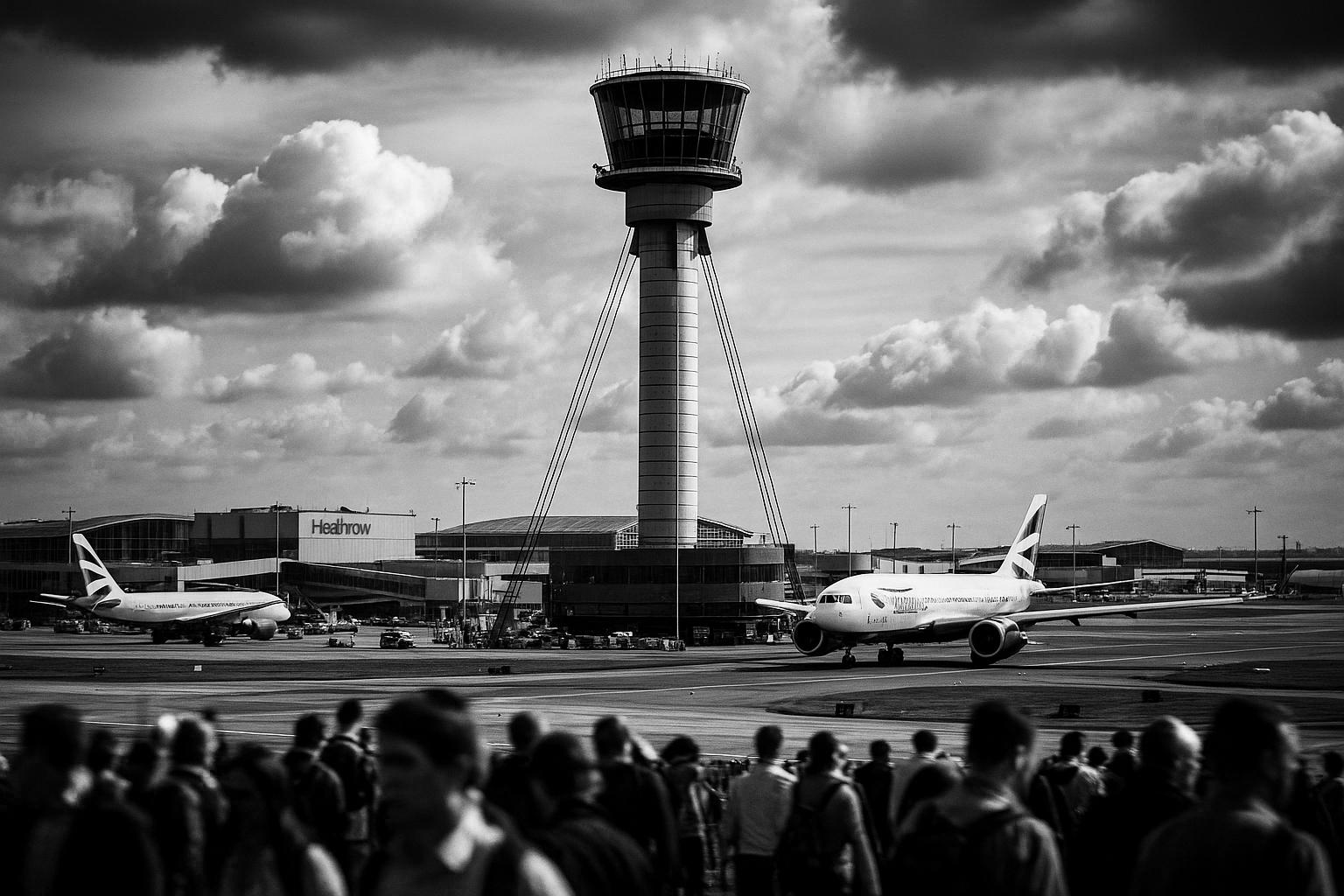As Heathrow Airport’s expansion proposals face scrutiny, the International Air Transport Association calls for a balanced, cost-effective approach prioritising operational efficiency and improved passenger experience, welcoming Arora’s alternative plan while critiquing Heathrow Airport Limited’s track record.
The future of London Heathrow Airport, the UK’s busiest and only global hub, remains at the centre of a complex debate as competing expansion proposals vie for approval. The International Air Transport Association (IATA) has voiced key concerns about the development plans put forward by Heathrow Airport Limited (HAL) and the Arora Group, urging a more cautious and efficiency-driven approach to expansion that prioritises economic benefit, operational management, and the passenger experience.
Heathrow stands as a critical gateway for the UK, contributing an estimated $160 billion to the national GDP—around 4.8%—and supporting some 1.6 million jobs. Its existing capacity struggles to meet growing demand, making expansion almost unavoidable to sustain the UK’s global connectivity and ambitions. However, IATA stresses that this growth must not come at any cost but should instead be executed with precision and accountability, ensuring maximum benefit for the economy, airlines, and travellers alike.
IATA’s concerns primarily focus on HAL’s management record. Despite substantial investments over the years, Heathrow has faced significant operational challenges, including failure to meet key service standards and a high-profile disruption during the airport’s closure in March, which stranded travellers and unsettled airlines worldwide. IATA criticized HAL not only for these operational lapses but also for its high charges and what the association sees as a self-promotional stance—claiming superiority in the planning process without sufficiently addressing the core priorities of cost control, efficiency, and customer service. The airline community, particularly major players like IAG, has long expressed frustration with Heathrow’s fees, fearing that expansion could exacerbate these costs unless effectively managed.
In contrast, the Arora Group presents a fresh alternative, promoting a proposal called ‘Heathrow West’ that includes a new terminal and a 2,800-meter runway. Notably, this plan avoids relocating the M25 motorway—a significant infrastructure hurdle in HAL’s plan—and aims to deliver a more cost-effective expansion, with estimates around £25 billion. IATA welcomes this as an opportunity for innovation and improved management, highlighting Arora’s experience with large-scale airport projects and understanding of Heathrow’s challenges. Airlines have shown support for Arora’s shorter runway option, viewing it as a means to reduce complexity and expenses.
The UK government is currently evaluating both proposals. Finance Minister Rachel Reeves has voiced strong backing for Heathrow’s expansion, framing it as a crucial resolution to the long-standing conflict between economic growth and environmental concerns. Meanwhile, Heathrow’s chief executive, Thomas Woldbye, has called for regulatory reforms to accompany expansion—particularly in airspace management and landing charges—to mitigate risk and uncertainty. Woldbye emphasises phased development starting with site upgrades but acknowledges rising costs, now likely to surpass the original £14 billion estimate due to inflationary pressures. The government also reaffirms its commitment to balancing expansion with environmental responsibilities and net-zero targets.
IATA’s broader position underscores the necessity of careful regulatory oversight to prevent cost spiraling and to maintain affordability for airlines and passengers. The association supports recommendations from the UK Transport Select Committee that advocate for empowering the Civil Aviation Authority to regulate airport charges more firmly, ensuring they remain flat in real terms. Rafael Schvartzman, IATA’s Regional Vice President for Europe, articulated the airline community’s backing of Heathrow as the right location for expansion but flagged affordability and operational flexibility as ongoing concerns threatened by current plans.
Ultimately, the expansion of Heathrow is more than infrastructure development—it is a pivotal factor in sustaining the UK’s status as a global aviation hub. IATA calls for a balanced, transparent, and customer-focused approach that drives operational efficiency and cost control, incorporating fresh perspectives like those from the Arora Group, while holding existing management to higher performance standards. With the government’s decision looming, the aviation industry watches closely for a resolution that supports growth, sustainability, and a high-quality travel experience.
 Reference Map:
Reference Map:
- Paragraph 1 – [1], [4], [7]
- Paragraph 2 – [1], [4], [7]
- Paragraph 3 – [1], [3], [6], [7]
- Paragraph 4 – [2], [3], [7]
- Paragraph 5 – [2], [5]
- Paragraph 6 – [4], [6]
- Paragraph 7 – [1], [3], [7]
Source: Noah Wire Services
- https://www.travelandtourworld.com/news/article/iata-reacts-to-heathrow-expansion-proposals-a-call-for-efficiency-and-better-management-for-a-better-travel-experience/ – Please view link – unable to able to access data
- https://www.reuters.com/world/uk/britain-consider-rival-plans-heathrow-airport-expansion-2025-07-30/ – The UK government is evaluating competing proposals for Heathrow Airport’s expansion. The Arora Group has submitted a plan titled ‘Heathrow West,’ which includes a new terminal and a 2,800-meter runway, avoiding the relocation of the M25 motorway and aiming for a cost-effective expansion estimated at £25 billion. In contrast, Heathrow Airport is resubmitting its own 2020-based expansion plan, likely involving a full-length runway and significant infrastructure changes, including moving the M25. Finance Minister Rachel Reeves has expressed strong support for Heathrow’s expansion to resolve long-standing gridlock between economic growth and environmental concerns. Airlines, notably IAG (owner of British Airways), have long criticized Heathrow for its high fees and are concerned that expansion may raise costs further. IAG supports the shorter runway option from Arora, believing it would reduce costs and complexity.
- https://www.iata.org/en/pressroom/2025-releases/2025-08-01-01/ – The International Air Transport Association (IATA) has commented on proposals for the future development of London’s Heathrow Airport by Heathrow Airport Limited (HAL) and the Arora Group. IATA acknowledges the economic benefits of expanding airport capacity in the Southeast of the UK, including Heathrow, but emphasizes that this must not come at any cost or assume that the current operator is best placed to deliver the value that the UK’s economy critically needs for growth. IATA’s Director General, Willie Walsh, highlighted concerns over HAL’s performance, citing regular failures to meet agreed service level standards and the March closure of the airport as significant issues. IATA also criticized HAL’s high charges and self-promoting suggestions that its proposal is superior due to a head-start in the planning process, arguing that such claims overlook the true priorities of the UK, airlines, and travelers. IATA welcomed the Arora proposal as a new perspective from a company with a respected track record and familiarity with Heathrow, stating that the decision is too important to be left solely to HAL’s viewpoint.
- https://www.iata.org/en/pressroom/2025-releases/2025-01-29-01/ – The International Air Transport Association (IATA) issued a statement following a speech from UK Chancellor of the Exchequer, Rachel Reeves, indicating government support for expanding UK airport capacity. IATA emphasized that the UK’s global position economically and socially would benefit from additional airport capacity in the Southeast. While opportunities for relatively swift increases at Gatwick and Luton should be seized, IATA highlighted that Heathrow’s decline in status is not about capacity but about cost, with charges remaining among the highest in the world. To bolster UK competitiveness, IATA stressed the importance of reducing charges and not increasing them further, ensuring that today’s airline users are not saddled with costs that should be borne by the airport’s shareholders and the eventual users of new capacity. IATA also called for regulators to be extremely firm on cost and efficiency matters, especially as environmental and economic barriers to expansion are formidable. Additionally, IATA advocated for more immediate measures to improve the UK’s aviation competitiveness, such as cutting the Air Passenger Duty (APD) tax and the Electronic Travel Authorization (ETA) visa waiver charge, and providing stronger incentives for cheaper sustainable aviation fuels.
- https://www.ft.com/content/2578e9d4-cc2e-4491-af3f-469869d6881b – Thomas Woldbye, chief executive of Heathrow Airport, has called for major reforms to the UK’s air travel regulations to enable the construction of a third runway. The third runway has gained support from Chancellor Rachel Reeves and Prime Minister Sir Keir Starmer, but Woldbye emphasized the government’s role in addressing risks and uncertainties through airspace reform and regulatory model changes for landing charges. Woldbye expressed confidence in the government’s support and announced plans for a phased expansion, starting with upgrades to the existing site. The project, to be privately financed, is expected to cost significantly more than the previously estimated £14 billion due to inflation. Woldbye also raised concerns about how expansion might lead to higher carbon permit prices, potentially impacting other industries. The Department for Transport acknowledged the benefits of expansion while committing to environmental obligations and net-zero targets.
- https://www.traveldailynews.com/associations/iata-airport-expansion-plans-the-right-place-at-the-wrong-price/ – IATA welcomed the UK Transport Select Committee’s endorsement of Heathrow as the right location to expand the UK’s airport capacity but warned that the costs could still spiral out of control. IATA also welcomed the Committee’s recommendations that the government consider giving the Civil Aviation Authority greater powers to regulate Heathrow’s passenger and airline charges and that these charges be held flat in real terms. Rafael Schvartzman, IATA’s Regional Vice President for Europe, stated that the airline community supports Heathrow as the right location to expand airport capacity but has two overriding concerns: affordability and operational flexibility, both of which are jeopardized by the current plans from Heathrow’s owners. The Select Committee’s recommendations on cost control should be essential reading for the government, for Heathrow Airport Holdings Ltd (HAL), and anyone with a stake in the future of air transport in the UK.
- https://www.aviation24.be/airports/london-heathrow-lhr/iata-calls-for-scrutiny-and-competition-in-london-heathrow-expansion-plans/ – IATA has welcomed the UK government’s support for expanding Heathrow Airport but warns that expansion must prioritise efficiency, cost-effectiveness, and customer experience. The association criticises current operator Heathrow Airport Limited (HAL) for poor service, high costs, and management failures, citing the March airport closure as a major concern. IATA supports considering alternative proposals, including one from the Arora Group, and stresses that airlines—who will bear the costs—must have a strong voice in the decision. Aviation contributes $160 billion to the UK economy and supports 1.6 million jobs.
Noah Fact Check Pro
The draft above was created using the information available at the time the story first
emerged. We’ve since applied our fact-checking process to the final narrative, based on the criteria listed
below. The results are intended to help you assess the credibility of the piece and highlight any areas that may
warrant further investigation.
Freshness check
Score:
8
Notes:
The narrative is recent, published on 3 August 2025. The earliest known publication date of substantially similar content is 1 August 2025, when IATA issued a press release commenting on Heathrow development proposals. ([iata.org](https://www.iata.org/en/pressroom/2025-releases/2025-08-01-01/?utm_source=openai)) The report appears to be based on this press release, which typically warrants a high freshness score. No significant discrepancies in figures, dates, or quotes were found. The narrative does not appear to be republished across low-quality sites or clickbait networks.
Quotes check
Score:
9
Notes:
The direct quotes in the narrative are consistent with those in IATA’s press release dated 1 August 2025. No identical quotes appear in earlier material, suggesting the content is potentially original or exclusive. The wording of the quotes matches the press release, with no variations noted.
Source reliability
Score:
7
Notes:
The narrative originates from Travel and Tour World, a news outlet that appears to be a single-source platform. This raises some uncertainty regarding its reliability. The IATA press release serves as a reputable source, but the lack of corroboration from other established news outlets may affect the overall reliability of the report.
Plausability check
Score:
8
Notes:
The claims made in the narrative align with known information about Heathrow’s expansion plans and IATA’s concerns. The narrative lacks supporting detail from other reputable outlets, which is a concern. The language and tone are consistent with the region and topic, and there are no excessive or off-topic details. The tone is formal and appropriate for the subject matter.
Overall assessment
Verdict (FAIL, OPEN, PASS): OPEN
Confidence (LOW, MEDIUM, HIGH): MEDIUM
Summary:
The narrative is recent and appears to be based on IATA’s press release, suggesting a high freshness score. However, the reliance on a single-source outlet raises concerns about the reliability of the report. The plausibility of the claims is supported by known information, but the lack of corroboration from other reputable sources affects the overall confidence in the narrative’s accuracy.













